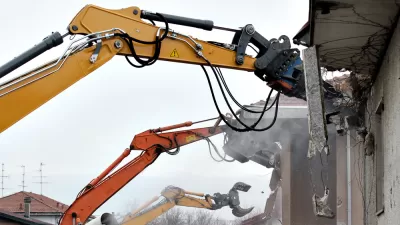A response to the conventional thinking about demolitions as the antidote to blighted, vacant properties and the negative effects that follow.
Columnist Dan Rodricks has a prescription for the city of Baltimore that departs from conventional thinking about demolishing vacant and blighted properties.
First Rodricks summarizes the arguments that support demolition campaigns:
- "People who call for bulldozing whole blocks seem to think that a developer will suddenly find the flattened area wildly attractive and build new, well-appointed "townhomes" for Baltimore's growing professional class."
- "Some people believe the demolition of old, decrepit Baltimore will create grand opportunities for more green space — vast city parks and sprawling urban gardens."
- "Some believe that, at the very least, more demolition will give areas of the city a psychological lift and a break from crime."
Maryland Governor Larry Hogan himself supports these arguments, as he states in a September 18 op-ed for The Baltimore Sun. In that op-ed, Governor Hogan promises to "advance a plan to knock down blocks of derelict buildings that tarnish communities across Baltimore, replacing them with parks and other open spaces."
Rodricks, however, thinks the governor would better support the city by sending money, rather than bulldozers. In his estimation, revitalization will require a complex policy agenda:
"Resolving Baltimore's vacant house problem involves vigorous housing code enforcement; going to court to seize properties; respecting the rights of homeowners who live in or near blighted properties and, if necessary, relocating them (at significant expense to taxpayers); getting developers to invest; giving financial incentives to homebuyers willing to rehabilitate houses; dealing with neighbors and raw emotions that can sink even small projects with great merit."
FULL STORY: How Hogan can best help city deal with vacants

Planetizen Federal Action Tracker
A weekly monitor of how Trump’s orders and actions are impacting planners and planning in America.

Congressman Proposes Bill to Rename DC Metro “Trump Train”
The Make Autorail Great Again Act would withhold federal funding to the system until the Washington Metropolitan Area Transit Authority (WMATA), rebrands as the Washington Metropolitan Authority for Greater Access (WMAGA).

DARTSpace Platform Streamlines Dallas TOD Application Process
The Dallas transit agency hopes a shorter permitting timeline will boost transit-oriented development around rail stations.

Renters Now Outnumber Homeowners in Over 200 US Suburbs
High housing costs in city centers and the new-found flexibility offered by remote work are pushing more renters to suburban areas.

The Tiny, Adorable $7,000 Car Turning Japan Onto EVs
The single seat Mibot charges from a regular plug as quickly as an iPad, and is about half the price of an average EV.

Supreme Court Ruling in Pipeline Case Guts Federal Environmental Law
The decision limits the scope of a federal law that mandates extensive environmental impact reviews of energy, infrastructure, and transportation projects.
Urban Design for Planners 1: Software Tools
This six-course series explores essential urban design concepts using open source software and equips planners with the tools they need to participate fully in the urban design process.
Planning for Universal Design
Learn the tools for implementing Universal Design in planning regulations.
Municipality of Princeton
Roanoke Valley-Alleghany Regional Commission
City of Mt Shasta
City of Camden Redevelopment Agency
City of Astoria
Transportation Research & Education Center (TREC) at Portland State University
US High Speed Rail Association
City of Camden Redevelopment Agency
Municipality of Princeton (NJ)





























